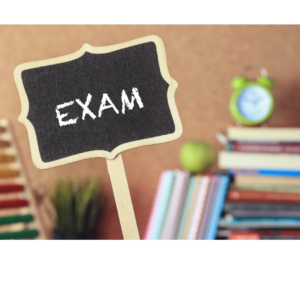When exams are round the corner, students are more prone to stress. As the pressure to perform increases, so does anxiety, leading to poor well-being. In this critical period, regular exercise can bring many psychological and physiological benefits to improve the academic performance. In this article, we explore studies and expert opinions on a myriad of benefits of exercising during exams.

1.Focus and Concentration
One of the primary benefits of exercising during exams is the enhancement of concentration and attentiveness. Exercise always causes an increase in the release of two neurotransmitters: dopamine and norepinephrine. These are responsible for attention and motivation. Researchers who conducted a study in the Journal of Clinical Psychology found that students who frequently exercised, paid more attention and had fewer distractions.
2. Exercise During Exams Decreases Stress and Anxiety
Exam time can be a nerve-wracking period for many students and may contribute to poor results. Exercise is the best stress-relieving agent during these times. Regular exercise has been proven to enhance the output of endorphins: chemicals in the brain that function as natural painkillers and mood elevators. Students who exercise have relatively lower levels of stress and anxiety, compared to those who don’t, says the American Psychological Association research.
3. Improved Memory and Learning
Exercising during exams also enhances memory and learning capabilities. Exercising has been shown to increase the size of the hippocampus, the area of the brain involved in memory formation. A study in Frontiers in Human Neuroscience concluded that students who underwent regular exercise, enhanced their memory retention, a critical factor to success in an exam.
4. Exercising During Exams Helps in Better Sleep
Good sleep is desirable as it helps study properly and can improve the mind. Exercising during exams has been known to improve the sleeping pattern. Regular physical activity can improve how well a person sleeps because it regulates the circadian rhythm. According to a report from the National Sleep Foundation, students who exercise more often have a better sleeping quality. This then, translates to better academic performance.
5. Exercising During Exams Builds Your Confidence
Exercising during exams can also enhance self-esteem and confidence. Increased confidence helps students feel more prepared and more capable of handling the challenges of their exams. A study in the Journal of Youth and Adolescence revealed that exercising adolescents boasted higher self-esteem levels.
6. Social Interaction and Support
Exercising during exams, such as taking part in group exercise or team sports, allows time for social interaction. Such social interaction is helpful, especially at times when exams are going on; it helps reduce feelings of being isolated, which, in turn, reduces stress levels.
7. Build Your Energy Levels
Exercising frequently prevents fatigue and builds high energy, according to a study in the British Journal of Sports Medicine. High-intensity exercise can greatly improve energy levels and reduce the feeling of fatigue that may develop after long hours in class or at home studying.
Quick Tips to Fit in Exercises While Studying for Exams
Usually, students run amok during the exam sessions. Be it school or college, their schedules tend to be hectic. While studying for exams, exercising is mostly left behind. However, incorporating exercising during exams can significantly enhance focus and reduce stress. Here are five quick tips to help you easily fit exercising within your study schedule:
1. Walking While Memorizing
One of the most effective ways to keep active while reading is to walk around. One can take a 10-minute walk while reading. It’s not just movement but also a time-saving method of keeping engaged with the study material. Walking keeps you lively and energetic.
2. Jumping Jacks to Quickly Regain Energy
Another fast way to get out of the study sessions’ monotony is doing 50 rounds of jumping jacks. Stretching one’s arms and legs and jumping around contributes to losing body fat. Doing jumping jacks habitually would prevent people from gaining weight, and it could give a lot of adrenaline in their system that can enhance concentration.
3. Plank for a minute to have Core Strength
The plank is a core-focused exercise. Fitness expert suggest setting a timer for one minute to hold a plank. This will not just increase the metabolism but also help reduce back pain and hence good for those who sit for long hours to study.
4. Squeezing a Sponge Ball to Relieve Stress
Another great but not so complicated activity to do is the pressing of a small sponge ball. You can help release tension in your wrists and forearms with this, and you can also minimize some of your stress while working with a sponge ball. Squashing a sponge ball can even enhance finger flexibility, which will be beneficial to students who depend on writing for most of their tasks.
5. Stretching the Whole Body for Relaxation
After hours of study, stretching exercises that cover the whole body can be very helpful in reducing tension. Stretching with deep breaths can reduce anxiety and stress levels and change the mood for the better. Stretching after study sessions can rejuvenate the body as well as the mind.
Conclusion
In summary, the benefits of exercising during exams are many and proven. From improved concentration and reduced stress levels to good quality sleep and increased confidence, regular exercise can bring mental and physical health to a whole new level during the stressful exams. Students should ensure they include exercises in their regular practice not only to ace their exams but also to foster wholesome well-being. A student’s commitment to physical activity might enable them to strengthen their resilience while being more effective in tackling the challenges posed by exams.
If your child is passionate about sports and aspires to build a career in this field, we provide tailored homeschooling solutions and NIOS (National Institute of Open Schooling) options to support their educational needs. For personalized guidance that aligns with your child’s unique journey, please reach out to Mr. Vinay Kumar, our dedicated NIOS specialist, at +91 63619 38556.
Article by: Vidya Singhania


